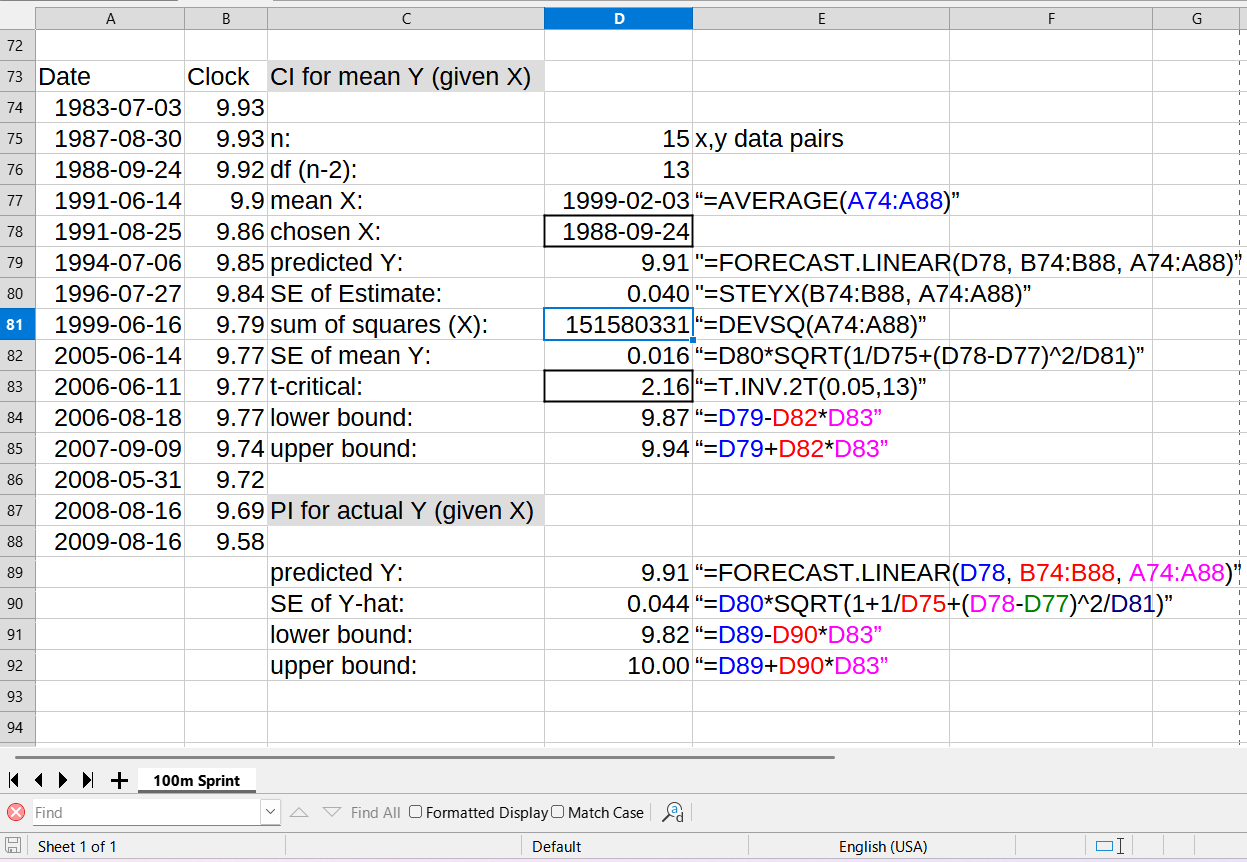As reported by Maria Zeee (Daily Pulse) over on the Vigilant Fox substack, Pfizer has cheated its way through its very own Phase 3 clinical trial. Possibly the most egregious transgression was when Pfizer had repeatedly experienced a “failure-to-report” regarding deaths among its treatment group.
Death is a pretty hard thing to miss, so failing to report it is often intentional.
Historic Cheating
Back in 1988, Canadian sprinter Ben Johnson blew past American track-&-field superstar, Carl Lewis, in the 100-meter sprint — taking the Gold Medal and smashing Carl’s world record. Mr. Johnson asked us to believe that, even though top sprint times in the world drop by 0.03 seconds every thousand days, he was 11 years ahead.
Mr. Johnson is the orange diamond at left, and each blue square is a world record being made. The equation at top right reveals that when “x” (the date) increases by 1,000 days (2.7 years), then 0.03 seconds will be found to have been shaved-off of the previous world record. The predicted world record time for 1988 was 9.91 seconds.
But Ben Johnson ran the 100-meters in 9.79 in 1988, a time that would not get beat until Asafa Powell ran a 9.77 a full 17 years later. Ben Johnson wanted us to believe he was “all-natural” instead of being juiced-up on the anabolic steroid, Winstrol (stanozolol). In reality, top athletes always look for the edge, so we can’t be too harsh.
I recall one survey where a sizeable portion of Olympic hopefuls admitted that they would be willing to die 5 years later, if they could only achieve the Gold Medal in the next Olympics. Talk about so much dedication that they are willing to “pay with their lives!” So let’s give them a break, and not brow-beat them for their “experiments.”
Yes, I know, cheating is a form of lying, so it is still bad. I’m just saying that it happens more often and is more “acceptable” among competing rivals than it is to the public. We get super-mad at them for doping, but the more informative question would be: Do they get mad at each other for it (or is it more-or-less expected to occur)?
Formal Detection of Cheating
To detect that Ben Johnson was “cheating” (all hopped-up on steroids) in 1988, you can run a 95% Prediction Interval to find out what the range of expectations were for that year. We already heard about the central-estimate world record of 9.91 seconds. But what range of values is still compatible with the overall trend of improvements?
The lower bound time on the Prediction Interval for 1988 was 9.82 seconds, meaning that that is the best that anyone could ever hope for if competing in 1988. It is the lowest time which is still compatible with the trend in reduction in times by all of the top athletes from all around the world.
Post-script: That blue square at very bottom-right is Usain Bolt, but so are the previous two blue squares. While a formal analysis was not performed on Bolt — who is, if you pardon the pun, damn near as fast as lightning — the downward trend in Bolt’s personal times is highly suspicious because he is improving very, very fast.
Reference
[timeline of world sprinting records] — https://worldathletics.org/records/by-progression/16647
[formal detection of cheating (spreadsheet notes)]:





